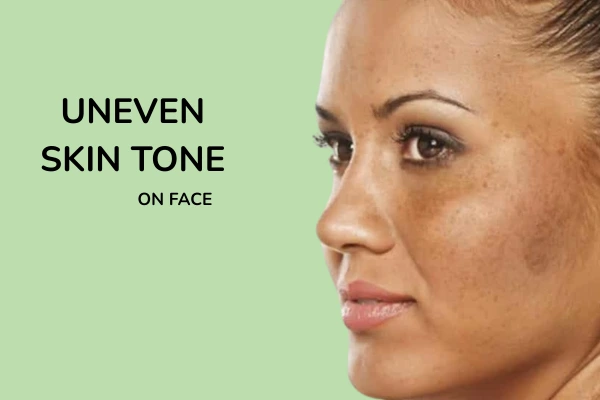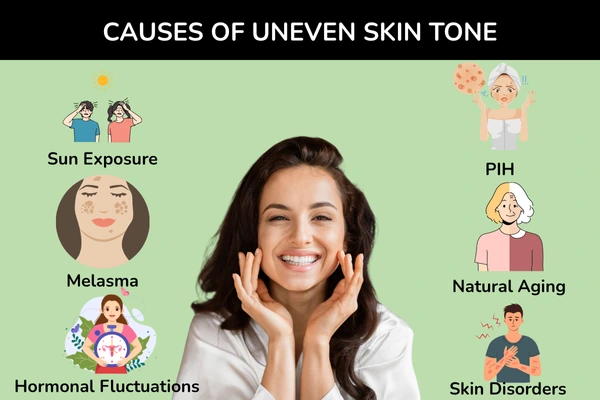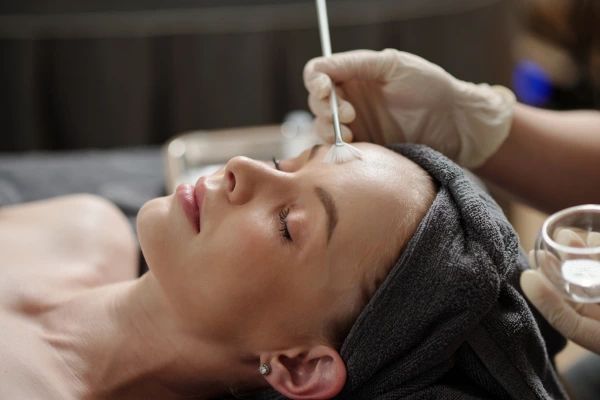Up to 25% OFF on Selected Treatments
-
Treatments
Acne and Scar
Pigmentation
Laser Hair Reduction
Dermato-surgery
Body
Anti Aging
Skin Rejuvenation
Others
- Clinics
- Blogs
Treatments
A smooth, even-toned complexion is often seen as a sign of healthy, youthful skin. But if you live in a bustling city like Bangalore, your skin faces unique challenges, intense sun exposure, fluctuating humidity, urban pollution, and a hectic lifestyle, all of which can trigger or worsen uneven skin tone. This common concern, usually referred to as hyperpigmentation, results when your skin’s melanin, the natural pigment responsible for your skin, hair, and eye color—is either produced in excess or distributed unevenly. While it is not medically harmful, uneven skin pigmentation can have a drastic effect on appearance. Whether it’s due to the city’s harsh UV rays, acne scars, hormonal imbalances, or environmental stress, understanding why your skin tone becomes patchy is the first step to achieving that clear, radiant glow you’ve been longing for.
In this comprehensive blog, our skilled dermatologists at Evenly Clinic aim to equip you with the root causes and best treatments for uneven skin tone available. So, if you are in search of how to get rid of uneven skin tone on your face, read on – your journey to radiant, smooth, and youthful skin starts here.

Uneven skin tone is an imperfection on the skin, especially the face, that shows up in the form of dark patches on face, patches of unusual redness, or scars. Moreover, this certain condition may also happen as a result of many things like aging, inflammation, the effect of hormones, and even exposure to the sun.

An uneven skin tone on the face is caused by the combination of internal and external factors. Once you pinpoint the triggers, you are better equipped on how to get rid of uneven skin tone on your face and ultimately have more radiant and smooth skin.
In Bangalore, the sun can be surprisingly harsh, especially between 10 AM and 4 PM, even on days that seem cloudy. The city’s high UV index combined with outdoor commutes, whether you’re walking through service roads, strolling in park, or riding through traffic, can easily trigger uneven skin pigmentation. That’s why a broad-spectrum sunscreen isn’t just a skincare step here—it’s a daily necessity.
Many women in Bangalore, especially during pregnancy or menopause, experience melasma or uneven skin tone on the face due to a mix of hormonal changes and sun exposure. In particular, this ‘issue’ impacts people at two different stages: during pregnancy and when hitting menopause. Melasma on face appears as mirrored mahogany or gray-brown spots on the cheeks, forehead, and lips and is frequently referred to as the ‘mask of pregnancy.’ In addition, these types of pigmentation require dermatological uneven skin tone treatment solutions such as chemical peels, topical lightening products, and laser toning treatments tailored for hormonal pigmentation.
Following inflammation caused by acne, insect stings, burns, or even small cuts, the skin will generate excess melanin during the healing process, leading to post-inflammatory hyperpigmentation. These blemishes will persist even after the original injury or breakout has healed, leaving behind dark stains or spots. PIH is especially prevalent in those with medium to deep skin tones because of heightened melanocyte activity. Targeted treatments for irregular skin tone, including retinoids, azelaic acid, microneedling, or fractional laser treatment, may speed up fading.
As we get older, cumulative environmental stress, particularly from sun exposure, appears as age spots or liver spots. These flat, brown spots generally show up on parts of the body that get the most sun, such as the face, hands, and chest. Also, your genetic predisposition comes into play. Some people are naturally more susceptible to irregular skin pigmentation because of increased melanin activity.
Chronic skin diseases such as eczema, atopic dermatitis, or psoriasis may also impair the skin barrier and cause uneven pigmentation. Inflammatory flare-ups usually cause increased melanin production as the skin attempts to heal, leaving dark spots behind. Likewise, repeated injury to the skin—like picking acne, burns, or forceful exfoliation—can trigger melanogenesis. Early treatment with anti-inflammatory skincare and professional therapies can help correct a more even tone.
Your skincare regimen may be doing more harm than good. Irritating ingredients in skincare products, like alcohol toners, harsh acids, or fragrances, can cause inflammation. In sensitive skin, this can result in post-inflammatory hyperpigmentation. Allergic reactions to cosmetics or even environmental allergens can manifest as redness at first but later result in darker patches. Changing to dermatologically tested, non-comedogenic, and hypoallergenic products can ensure an even complexion and avoid pigment disruption.


Professional treatments for uneven skin tone are carried out by our skilled dermatologists, these treatments can significantly reduce the appearance of hyperpigmentation. It not only addresses the root causes of uneven skin pigmentation and is more effective and powerful than over-the-counter skin care products. Below are some of the best treatments for uneven skin tone offered at Evenly Clinic:
Laser treatments such as Q-switched ND YAG laser and fractional CO2 laser resurfacing have proven to be powerful lasers in addressing uneven skin pigmentation and restoring a healthy, even skin tone. Laser toning technology emits broad-spectrum light that targets melanin clusters in the skin specifically, breaking them up. Fractional lasers, meanwhile, create very small, controlled micro-channels in the skin, which stimulate a natural healing process. This procedure not only gets rid of dark spots but also promotes new collagen production, which adds to the texture of the skin. Although one can notice an improved appearance after one or two treatments, a treatment series is most often advised to achieve optimal outcomes. Little or no downtime occurs in most individuals, and this makes laser treatment a convenient answer for most patients who are looking to improve their uneven skin tone on the face.

Chemical peels are another uneven skin tone treatment recommended by our dermatologist to address skin pigmentation. It employs professional-grade chemical solutions to gently exfoliate skin’s outer layers. This peel dissolves damaged, pigmented epidermal skin cells on the surface, creating a brighter and more even-looking complexion beneath. In addition to smoothing out skin tone, chemical peels boost texture and stimulate collagen regeneration. They are available in different strengths – superficial, medium, or deep – based on the severity of pigmentation and your skin’s tolerance. The results and downtime of a chemical peel depend on its specific type.
Must Read: Chemical Peel or Laser Treatment for Pigmentation: Which is Best for You?
Microdermabrasion is a gentle, non-surgical treatment that uses fine abrasive particles or a diamond-tipped device to exfoliate the topmost layer of dead skin cells. Exfoliating the skin’s surface enhances the look of dark spots, smooths rough texture, and boosts natural collagen production. This treatment is less effective than laser treatments or chemical peels and usually requires minimal to no time for recovery, making it an ideal choice for individuals looking for gradual improvement in skin clarity and tone.
For more stubborn cases of hyperpigmentation, dermatologists often prescribe prescription-strength topical creams that effectively combat irregular skin color. These can contain active substances such as retinoids, hydroquinone, or corticosteroids. Retinoids, which are vitamin A derivatives, stimulate cell turnover in the skin to help smooth out dark spots over time. Hydroquinone acts by inhibiting the production of melanin, thus bleaching away excess pigmentation areas. Corticosteroids, being anti-inflammatory in nature, are especially helpful in treating post-inflammatory hyperpigmentation (PIH) by soothing the underlying inflammation. Since these creams contain strong chemical agents, they may have side effects if used improperly. They must be applied strictly under a dermatologist’s guidance with a customized treatment plan for maximum and safe effects.
To address the depths of uneven skin color, our dermatologists may also prescribe a customized treatment plan. For instance, combining topical depigmenting agents with treatments such as laser toning, chemical peels, or microneedling can yield synergistic benefits. This multifaceted approach enables concurrent treatment of surface discoloration and deeper dermal pigmentation, enhancing visible improvement and achieving a more even, luminous complexion. The combination of choices is usually tailored according to the patient’s skin type, severity of pigmentation, and general health of the skin.
The appearance of uneven skin tone on the face, typically resulting from hyperpigmentation, is both common and treatable. By knowing the underlying causes and practicing a regular skincare regimen—particularly focusing on sun protection, brightening ingredients, and mild treatment—you can slowly attain a fairer and brighter complexion. Remember, skin change is not instant, and every person’s process is distinct. With proper guidance, products, and perseverance, smoother and more balanced skin is possible.
Living in Bangalore means your skin needs extra care to handle sun exposure, pollution, and the pace of city life. At Evenly Skin & Hair Clinic, we combine advanced dermatology with an understanding of Bangalore’s unique environmental factors to deliver visible, lasting results for uneven skin tone treatment. Whether you seek to address pigmentation, improve the texture of your skin, or learn more about professional treatments for uneven skin tone such as chemical peels, laser toning, or microdermabrasion, we are here to help you. Schedule your appointment with Evenly Clinic and get started on your journey to even, healthy-looking skin.
Let your skin shine gorgeously and evenly with professional treatment at Evenly.
Visit us at:
Evenly Skin and Hair Clinic – HSR Layout
Third Floor, 815, 27th Main Rd, above Bluestone, 1st Sector, HSR Layout, Bengaluru, Karnataka 560102
Evenly Skin and Hair Clinic – Jayanagar
35, Ground Floor, Vinyas Arcade, 11th Main Rd, Vishya Bank Colony, 5th Block, Jayanagar, Bengaluru, Karnataka 560041
For health-related information, follow us on Instagram!!
Is uneven skin tone the same as hyperpigmentation?
Hyperpigmentation is indeed one of the most common types of uneven skin tone. It happens when certain parts of the skin produce excess melanin over other areas, resulting in darker patches or spots.
How can I get rid of uneven skin tone on my face naturally?
Home remedies such as aloe vera, turmeric, or green tea extracts are not as potent as dermatologist-approved products. But using it will help you to clear it to some extent, but always seek doctors’ help before using any natural remedy.
Is uneven skin tone permanent?
No, it is normally treatable. But unpigmented spots might be slower to fade if not treated. The sooner you get treated, the better and quicker the results are likely to be.
Can sunscreen help prevent uneven skin tone?
Yes, sunscreen is important. Daily application of a broad-spectrum sunscreen (SPF 30 or 50) prevents additional pigmentation and shields skin from UV-induced overproduction of melanin.
Will uneven skin tone get worse with age?
Yes, with age comes an increased risk of uneven pigmentation from cumulative sun exposure, decreased cell turnover, and hormonal changes. Preventive care and professional treatments can help slow down this process.
We hope this information is helpful. If you have any skin and hair-related questions or would like to discuss personalized solutions, please reach out to us at 7337899030. Our team of specialists is committed to delivering personalized care tailored to your specific needs. Take the first step towards a healthier, more confident you by scheduling a consultation with us today. Your journey to vibrant skin and stronger hair begins here.
Book an Appointment
Start your journey to healthy skin and hair today.
Leave a Comment